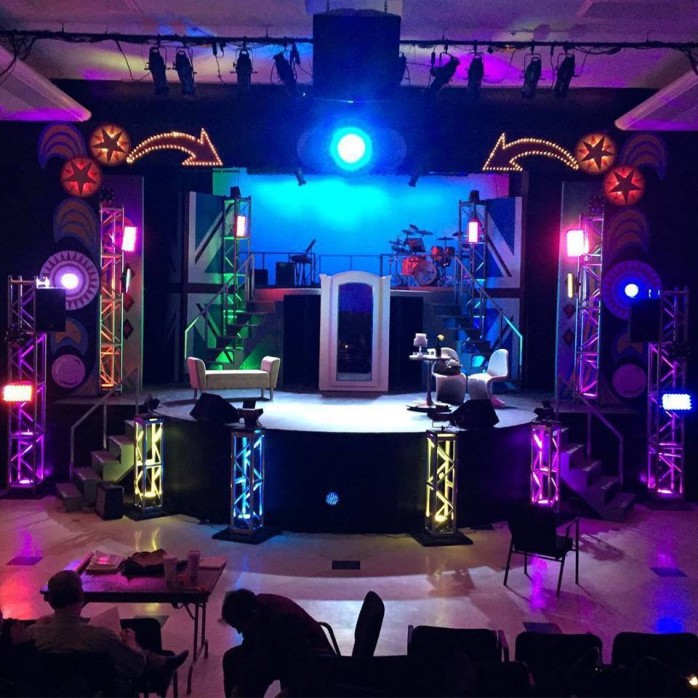
Lou.com: This is something that started off as a concept album. In 1969. It’s been retold as a ballet; obviously now as a musical.
JL: Right, right.
Lou.com: This story has had so many different metamorphoses along the way. Is this what makes it so iconic? Is this what makes it a story that is so worth retelling?
JL: As long as it stays relevant, I think, of course it’s worth retelling…Those classic shows still have issues…So as long as they stay relevant, they will stay true and be able to be retold...I think "Tommy" is still relevant. I really do.
Lou.com: Especially even this past week- such a progressive week.
JL: And you look at it, and you go, really, nothing has changed. As far as I could have done the show today and costumed it today. We could have costumed it from Desert Storm. You know, it could really be retold completely out of period. It could be told in a non-period.
There’s something also to be said about how it’s told, which is interesting. That whole inner monologue that we as actors are taught to use - we hear it. We hear Tommy saying his inner monologue, so we know every thought he’s going through.
Lou.com: How does that change it?
JL: … We’re more sympathetic to him. We see his confusion. We see his kind of distorted view of life…We take the ride with [him] more…It’s kind of like we’re together with him.
Lou.com: There are some people who only know of this story as that concept album. What would you tell the people that know The Who and are fans of The Who? What is added in a theatrical retelling?
JL: When you read a book …it’s no different. They’re going to have a vision of what "Tommy" is and who Tommy is, and it’s going to be different. This is the telling of one person’s interpretation of who Tommy is in this show. So, I look at that as kind of an opportunity.
To see it come to life on stage was incredible to me. I don’t know how people will react. There are diehard fans of "Tommy" and The Who…They know the music…They lived it. They associate it with a part of their life…I hope they like it.
Lou.com: What would you tell the people who aren’t familiar- why should they see the show? Obviously aside from the real-life issues, that it’s clearly relevant, and it’s going to be a fantastical sight to see.
JL: I think it’s going to be a cacophony of sights, sound, and story. You won’t get a story like this. I can’t think of another musical like this. It’s like a once-in-a-lifetime feel, and it’s not done enough that you’ll be like, “Oh, I’ll see it again in a few years.”
So, it’s one of those shows that take the chance. Go see it. Hold on to this chance, because you’re not going to get another one. And I tell people, any time anyone sees any one of my shows, just open your mind.
I think [the audience is] going to love the music. I think…to get a chance to sit and listen to "The Who’s Tommy" in one sitting with a live rock band on stage and great singers singing it, even if they shut their eyes and didn’t watch the entire show, that it would still be great.
Lou.com: You said you had guitarists clamoring for this opportunity. How do you go about choosing the orchestration for something like this to bring the sound to stage?
JL: Angie, our music director, chooses her orchestration…A lot of electronic sounds are needed. There’s a lot of distortion of sound to try to create that world. So it’s a very electric show. There’s only one instrument that’s acoustic, and that’s the French horn. It was written by The Who. I think the drummer or some band member is a French hornist. And the French horn is important. Ernie plays the French horn…at Christmas [dinner], and that’s the first indication that Tommy responds to sound…There’s tons of French horn. Big solos in it. Which I think is interesting, right? But yeah, the rest is electric. Big, electric show. It’s like a rock band up there.
Lou.com: And Tommy, the character is notably “deaf, dumb and blind.”
JL: But he’s not.
Lou.com: They chant that in “Pinball Wizard.” And he feels the world through those vibrations. How do you interpret that as a director? Aren’t his senses electrified in some senses in a greater way?
JL: I think, yes. I think that is it. Well, he definitely responds to music. You know, a lot of people think Tommy is autistic… And there’s “deaf, dumb and blind." That reference is to how the world perceives from the outside looking at him - that he’s deaf, dumb and blind. He hears everything. He sees everything. And he’s definitely not dumb. He has just gone into a self-imposed world that he can’t break out of and doesn’t want to break out of. I think he wants to live. I think that when this moment happens in the show, his mom thinks she’s protecting him, but she turns him to this mirror where he still sees everything in the mirror…And you think, “What is a mirror?” It’s a mirror to the inside of you. You know, that whole metaphor is amazing.
He feels and sees things, maybe even clearer than we do. This world’s safe for him…and that’s where he escaped to.
Lou.com: And everyone has that safe space; it’s just everyone reacts in a different way.
JL: Yeah, you know, it’s a powerful piece. I think it’s very academic in that it’s very thoughtful. It has a lot of references to medicine, a lot of references to psychiatry…It gives a nod to that; the experimental side of medicine, and then there are those diseases that we can’t cure. They could not cure him. They did not know what was wrong with him. That kind of takes us on a journey too.
And then once he does come out of it, then they want to know, “Well, what did you have? What’s going on now? How are you differently medically than when we did the first round of tests?” Again, it’s going to be something that people have never seen anything like.
There are some moments in Next to Normal that are kind of like that…that whole gurney moment of her when she’s watching herself get the ECT. That reminds me of a Tommy moment, where it’s out of body, she’s the narrator… she’s up here watching herself, and it’s medical, but yet, it’s kind of over-the-top medical, and again, experimental. It just felt like a nod to "Tommy," for me…It’s a show like I’ve never directed. And I’ve directed a lot of rock operas. I’m really enjoying it.
But it’s hard though. I will tell you, it’s a tough piece. It’s tough. It’s tough to tie all of these characters together. When you have a character that doesn’t talk to any other character, that’s isolating. As an actor, we strive from reaction to people. He can’t do that. He can’t look at them. He can’t give eye contact. He can’t facially respond. As an actor, I can’t imagine - that’s an amazing challenge…
Lou.com: I know in Fiddler on the Roof, you had that kind of ghoulish nightmare scene. It was charged by those really amazing costumes. Do you have something like that in Tommy? Is it those doctor’s visits you were telling me about?
JL: Well, they’re different. I think “Pinball Wizard” is going to be the most electric when you see it costume-wise. Their colors are going to explode onto that stage…And they’re not real colors. When you see these guys in suits, you’re not going to believe, “Oh, they would wear that.”
Lou.com: The point is to create this false reality.
JL: That is a world, a crazy world…When we get to the end, we start to go to Tommy’s world, and that sixties world. I’m going to take it to all black and white costumes with nods to that "Tommy" yellow - that gold.
Everyone will have pieces of Tommy on them, so it feels like he has affected them in that way. When they’re all in the finale, you’ll look up, and it will all be black and white, and just touches of that gold. At least, that is the effect that I’m looking for. That effect that Tommy has come into their lives and that he’s a part of them. They might have even started dressing like him a bit… So, I don’t know if we have that black light crazy, but then again, the whole show might be that. Because it’s light. It’s going to be crazy. I’ve told Theresa it has to be crazy lights.
Lou.com: That’s a great way to start the season.
JL: You just have to go wild with it, you know? You have to go wild with it.

Pinball machine available to be played at CenterStage, courtesy of Zanzabar.
**
"THE WHO’S TOMMY" at CenterStage at the JCC
Book by Pete Townshend and Des McAnuff, music and lyrics by Pete Townshend, additional music and lyrics by John Entwistle and Keith Moon.
July 9-19, 2015
Thursday, July 9 at 7:30 p.m.
Saturday, July 11 at 7:30 p.m.
Sunday, July 12 at 2 p.m.
Sunday, July 12 at 7 p.m.
Monday, July 13 at 7:30 p.m.
Thursday, July 16 at 7:30 p.m.
Saturday, July 18 at 7:30 p.m.
Sunday, July 19 at 2 p.m.
Sunday, July 19 at 7 p.m.
Tickets at:
Phone: 238-2709
Online (Click here)
Take the chance. Be bold. Enjoy one of the finest parts about living in Louisville: our wickedly talented theater scene. Leffert's a genius and never disappoints. Opening night is Thursday!
**
All Photos: Courtesy of JCC CenterStage's facebook page



